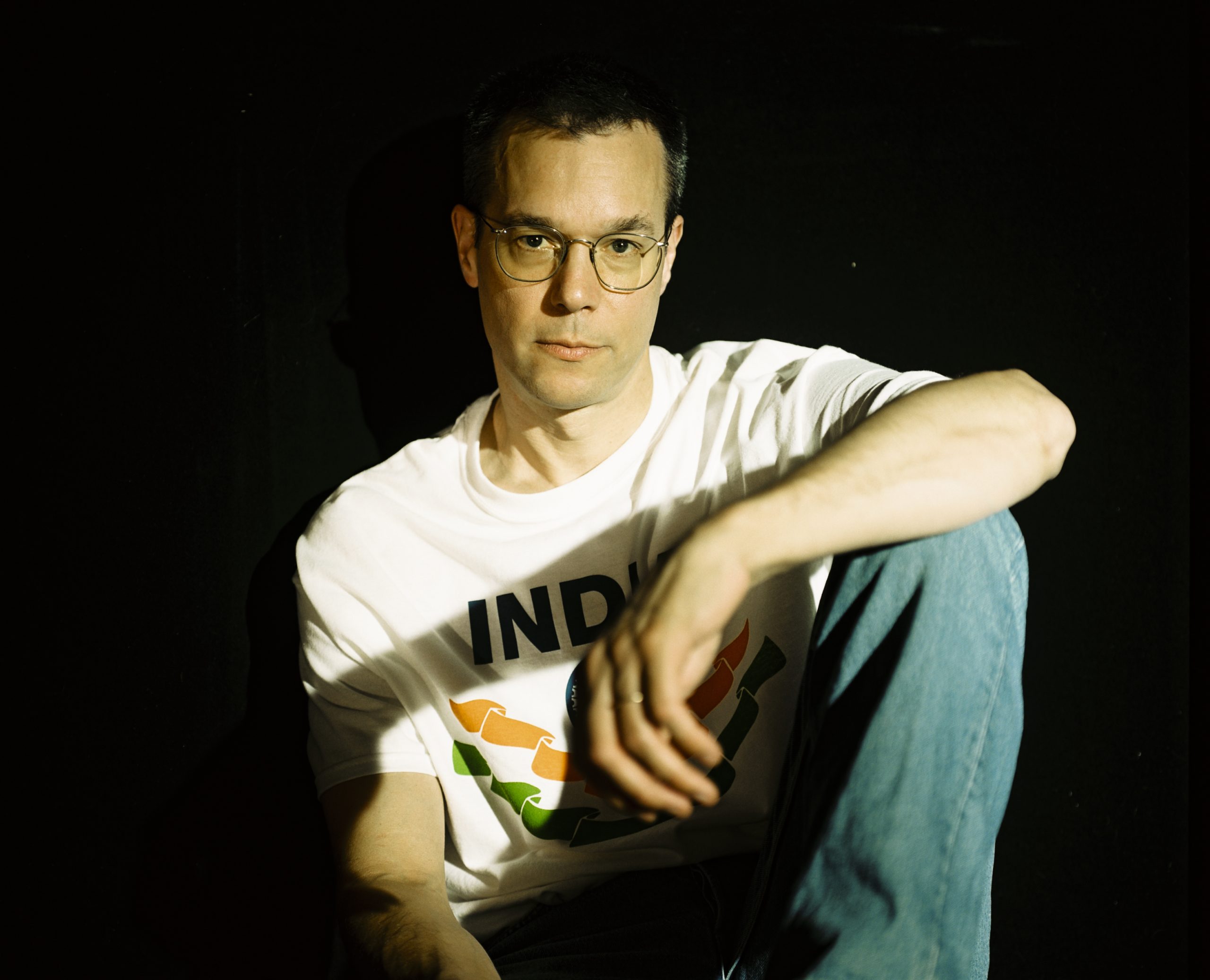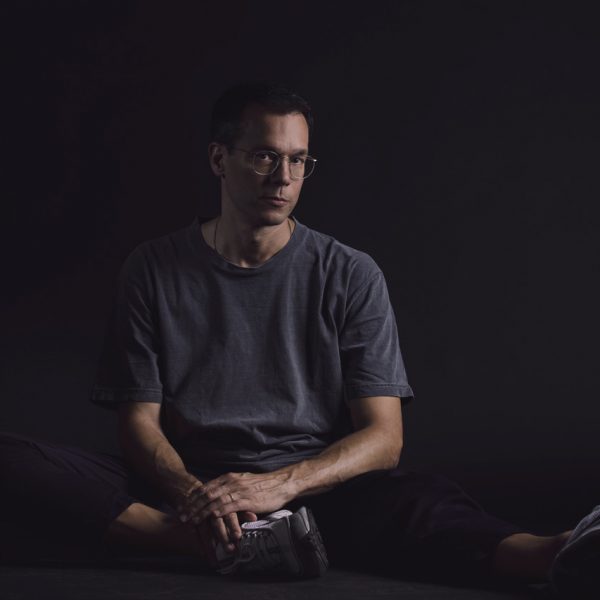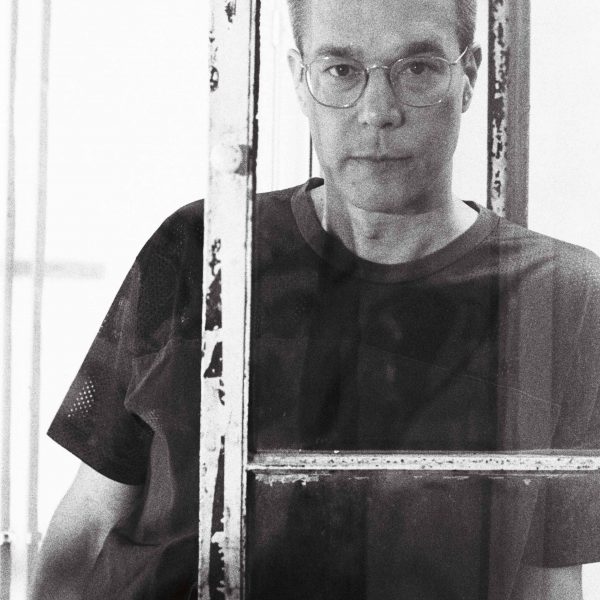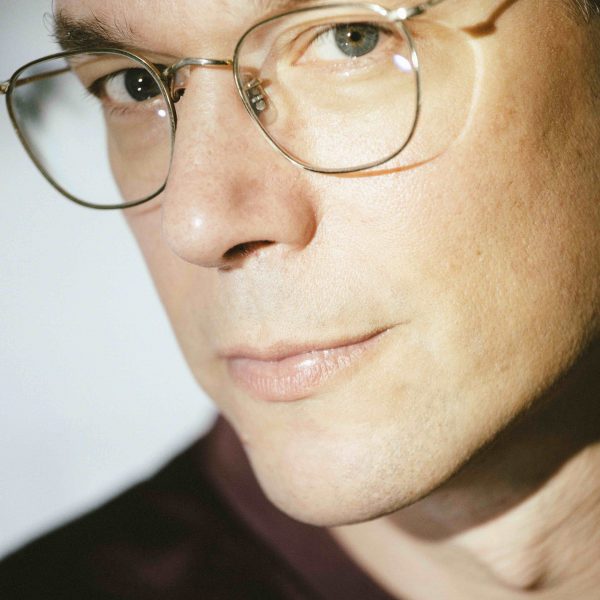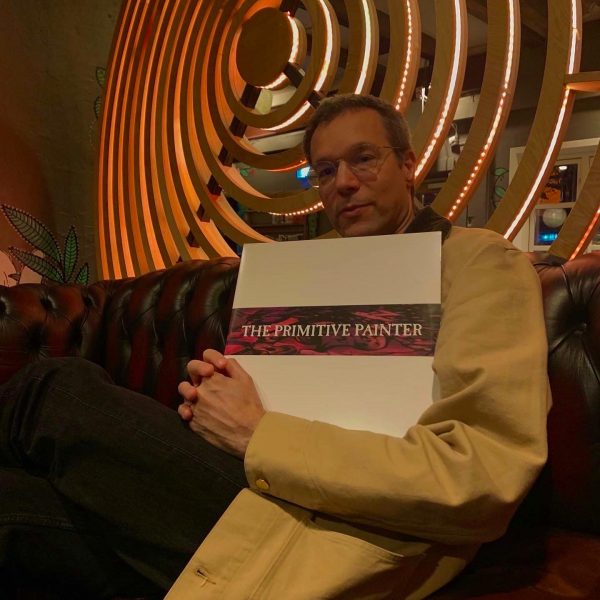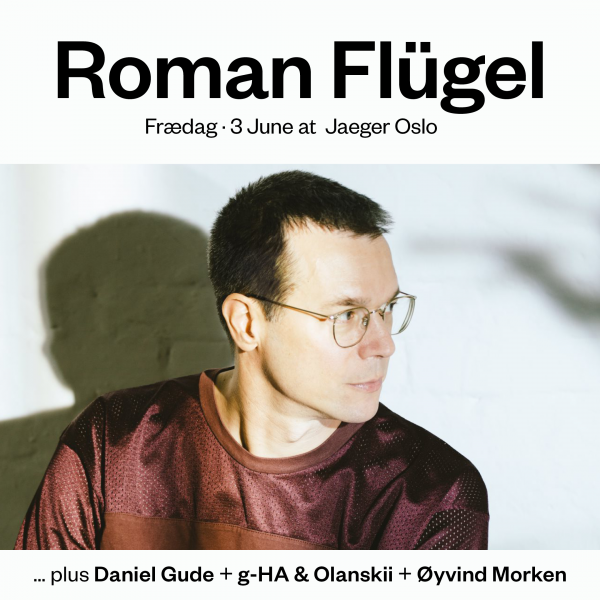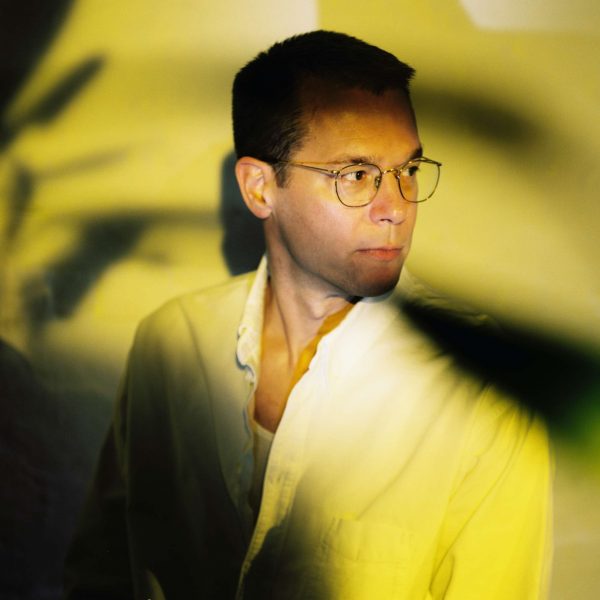You don’t simply dip into Roman Flügel’s discography. The Frankfurt artist has been nothing short of prolific. Whether working alongside Jörn Elling Wuttke on the myriad of projects, ranging from Acid Jesus to Alter Ego, or his own extensive solo discography (under some more aliases), there is an expansive undertaking awaiting those willing to venture into Roman Flügel’s catalogue. In a career stretching a little over three decades, including his collaborations with Wuttke, his work has become seminal touchstones through the various epochs of club music.
You wouldn’t assume that from his demeanour. Humble and friendly, he’s accommodating when we sit down for a conversation in the bar at Jaeger. A regular visitor to our club, we’ve come to know Roman as one of the nicest DJs to pass through our booth. He cuts a striking figure. Tall with angular facial features which have only seemed to sharpen with age. Sitting across from him, it’s hard to believe Roman Flügel is 52 years old and that he’s been there since the very beginning of Techno music. “Talking about age,” he says in his familiar German accent, “I don’t think too much about it, you can’t do anything about it anyway.” He finds it “really interesting” to play alongside the next generation of DJs, and he’s quite aware that the music he buys is often made by people who “are probably younger,” but he’s only content in that fact. “That’s the way it is,” he says completely deadpan, “and that’s the way it should be.”
“Touring and what I am doing,” he continues “is something I always dreamt about. When I was young I wanted to live the exact life I’m living, so why should I complain?”
Roman grew up in Frankfurt, coming of age in what was probably the most crucial time for Techno, not least in Roman’s hometown. While the wall was coming down in Berlin, opening up a world of music from places like Detroit, Frankfurt was experiencing its own revolution in sound, almost independently. ”It was an interesting time, because you had all these scenes in different cities,” remembers Roman. “Even cities within Germany had completely different scenes.”
As technology and intent conspired, it developed into a new musical frontier called Techno and House music, and at Frankfurt they were right there on the cusp of this new wave of music. (It’s even believed in some circles that the term Techno was coined in Frankfurt, but Roman is not so convinced.) Clubs like Dorian Gray and Omen became influential bodies in the landscape, stepping out of the sound of Belgium New Beat, New Wave, Synth Pop towards the more functional domain that these dance floors soon demanded with DJs like Talla 2XLC and Sven Väth adopting Techno and House in their sets early on. Roman Flügel was a sprightly 16 year-old when he first started frequenting Dorian Gray.
“I sneaked in with some girls I knew – You always had to go in with girls otherwise you wouldn’t come in,“ remembers Roman. The club had “no curfew”, because it was located at the airport, and Roman distinctly recalls “polishing his shoes in the airport toilets” before visits. It wasn’t a mere coincidence that Dorian Gray would be his first choice, because the club’s reputation preceded itself even then. His first taste of electronic music came via the iconic club, sometime before he even set foot in the place.
His older brother had been a Dorian Gray regular and would bring home bootleg tapes from the club. ”People would copy sets from Dorain Gray,” he explains, “and sell them for 50 Deutsche marks.” That was a lot of money back then, but it was also the “only way to get information” about this new music according to Roman. “You would hear the music in the club and then it was gone afterwards,” so the tapes were instrumental in proliferating the sound of House and Techno at that time.
“As a young kid, a 90min cassette would open a whole new world for me,” recalls Roman. Naturally, he started out as a “fan,” and his love for this music only solidified with time, especially after the appearance of the Omen. After Dorian Gray, “The Omen was the place for me to be,” insists Roman. As House and Techno developed out of their initial prototypes, the Omen became the “main place for House and Techno” in Frankfurt and continued to open up a new world for the young Roman.
Although he had been playing as a drummer in a band, the lure of electronic music was stronger. Curiosity eventually got the best of him and at some point he asked himself: “how do they do this kind of music?” He started visiting local musical instrument shops, “trying synthesisers and finding out how they made the sounds” he had heard on his tapes and at these clubs. Eventually he thought; “Maybe I should use a drum machine instead of being a drummer” and his fate was sealed.
The rhythm remained central to dance music’s appeal for Roman as he found a new outlet through the sound of machines. He started putting his efforts to demo tapes via a four track recorder in a bedroom at his parent’s house, playing them to friends who would orbit the same indie bars he would haunt at that time. Eventually somebody told Roman: “You better give one of your demo tapes to Jörn (Elling Wuttke) because he has a better studio than you at your parent’s house. He has a studio at his grandfather’s house in the garage!” Jörn was a singer and guitarist in a band that moved in the same musical circles as Roman, and the pair quickly found a common ground between their creative personalities.
“It’s always a different dynamic when you start to have an interaction,” remarks Roman about their working relationship. “Things become very tense and at the same time very different. Somethings would pop up that you would have never created on your own.“ They started bringing their demos to their local record store Delirium, another iconic name in the early Frankfurt scene, run by ATA – long before he moved on to establish legendary Frankfurt club, Robert Johnson – and Heiko Schäfer. “They liked them a lot” and put out the first Acid Jesus record, cementing a production partnership that lasted over 15 years and went through many different guises from Acid Jesus to Alter Ego during the course of their career.
Why all these … alter egos? “It’s a bit strange, ja” Roman agrees. “The beginning of an era, you would have a lot of different people asking you to put out a record on their label, but then they would ask for a different name“ to perhaps distinguish their label from another that the artist might also appear on. It did “become very complicated at some point,” but it was all consolidated as Alter Ego eventually in the early 2000’s at what was probably the pinnacle of their success together.
Alter Ego had been around as a project for almost as long as Roman and Jörn had been working together, but as they stepped out of the nineties into the next millennium, the sound of the project changed and suddenly made an incredible impact on the scene and beyond. For an entire generation it was Alter Ego and specifically the track Rocker that brought people to the work of Roman Flügel. The gnawing synthesisers and accessible melody of the track was the perfect crossover point from guitars to synthesisers at a time when rock music’s dominance was finally waning. Arriving at the time of electroclash, it brought a whole new, and different kind of audience to club music.
“We were amazed by the success of the record,” says Roman. “It was a crazy time,” for them with world tours and notoriety following Rocker and the album, Transformer. “The rooms became bigger and bigger” as they rode the success of that record, sustained by a newfound popularity for electronic dance music. “After that electronic dance music became super big, especially in the US,” remembers Roman “but we weren’t taking part in that mega-success, we were at the edge of it.” It was a double-edged sword however and although Rocker was somehow the peak of our success, at the same time “it was the end of our studio-working relationship,” says Roman, looking back. The intensity had exhausted both Roman and Jörn. “At a certain point when you play your own music all the time, it becomes quite tiring. We didn’t have the power to reinvent ourselves.”
Amicably and cordially, Jörn and Roman went their separate ways. In their time together they had accomplished what most established artists only dreamed. Successful records, touring on an international stage, and remix and production credits for everybody, from Sven Väth to The Human League, all the while maintaining the elusive connection to the underground purists. There wasn’t anywhere else they could go, and it was up to Roman to reinvent himself, now working under his eponymous moniker.
He continued to work on dance floor focussed 12” with the purpose of something to “play as a DJ,” but at the same time there came a shift in his approach to albums. “I think especially after I finished working with Alter Ego back in the day,” confirms Roman. “That was a very dance floor oriented project for many years” and Roman wanted to take a step back from that, especially in the longer format. “My solo albums; all of them are more a listening experience for different environments than clubs.”
Three albums for Dial records; a conceptual audioscape for ESP; and his official debut on Frankfurt label Running Back, constitutes this period of albums over the last decade. From the minimal incantations of those Dial records to the lush ambient and break beat constructions of his latest, Eating Darkness, these records sound and feel like you’re at the entrance of a club; that moment you’re about to step through the doors. The rhythms take on abstract forms with only the faint glimmer of their four-four roots peaking through the shadows.
I suggest to Roman that even when he is not pursuing those impulses, the dance floor still echoes through even the most ambient incantations of a record like Eating Darkness. “It’s stored deep in my brain,” he agrees. Roman Flügel has an incredible instinct for this music. Over the course of 30 years, it’s been deeply ingrained. “It happens naturally,” and “it’s not conscious” on his part. “I use bits and pieces that I’ve heard in my life before,” he continues and when I suggest that I can hear glimmers of that first Warp 69 record through Eating Darkness, he merely gives a wry chuckle. I’m not sure if it’s the reference or perhaps that there is indeed a red thread between a song like “Jocks and Freaks”(2021) and “Floating”(1992) that has amused him, but it says something of the work that has, and continues to stay the test of time.
There’s an elusive quality that even underpins his collaborative works with Jörn, and it has a broader appeal than most dance floor records. Whether it’s your first experience with Alter Ego’s Rocker or finding a new favourite record in the form of Acid Jesus’ Interstate 10 years after that, no-matter where your finger lands, there’s bound to be a record and sometimes even a period where Roman Flügel has been either a significant or pivotal figure on the electronic music scene ordained for clubs.
Even as our conversation winds down, he talks about re-issues of records that I’ve never heard of before. “Tracks on delivery” stands out amongst these not merely for their rarity on Discogs, but the fact that the re-issue will see Roman Flügel playing live again, for the first time since his Alter Ego days. It evokes a memory of seeing an age-less Roman Flügel peering over a computer screen at Fabrikken in Oslo for Sunkissed around 2007. It’s that image I see later again in our basement on the day of our interview. He seems happier, somewhat more content behind the decks than the screen. The crowd, most of whom are younger, is reciprocating and I’m reminded of something he told me earlier that day. “It’s a beautiful thing to travel and play music and meet interesting people.”

